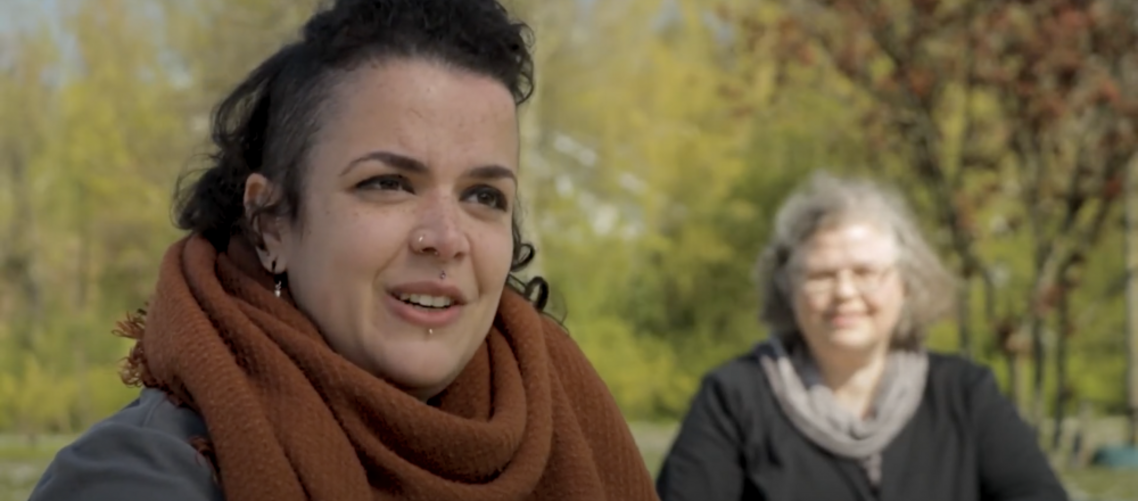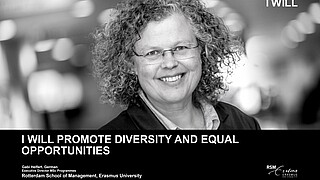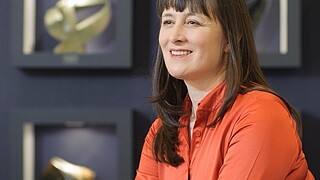RSM’s line managers can contribute towards a more inclusive workplace by considering people with functional impairments when seeking to fill vacancies. RSM’s Human Resources department helps by connecting line managers with organisations such as Studeren & Werken Op Maat (SWOM) — a Dutch foundation which helps young professionals with an occupational disability to get ahead in their professional lives and careers.
SWOM recently told the story of Simone Le Comte, a young professional who joined RSM’s MSc Programme Management team as process documentation assistant in 2020. The team is led by Executive Director of MSc Programmes Dr Gabi Helfert.
Simone: “I am very used to misconceptions”
Do you often encounter misconceptions about employing people with functional impairments?
“I am very used to misconceptions regarding people with disabilities. We are too difficult, need too much help, aren’t as capable as people without a disability, aren’t taken seriously and often need to work double as hard to make up for our disability. In most cases we are not considered to be worth the investment of time and money.
“I personally have flown under the radar for a long time, with my disabilities being invisible. But since I have had my assistance dog, this is no longer the case. I anticipated this during my last few months of university and started looking for help. I knew I needed a way to ‘explain’ myself to future employers without being rejected outright based on my disabilities. Through SWOM I was given that chance.”
“I was never alone”
Which steps did you take, along with Gabi, to create a working environment which fit your needs?
I have to give Gabi most of the credit here. She and her team had prepared my onboarding very well. As part of my application process they prepared an assessment. This gave me the possibility to show whether I had the necessary skills they were looking for. It removed a great deal of uncertainty on both our ends. Despite the fact that everything was digital (due to the coronavirus pandemic), at every step of the way someone on the team was there for me: as a buddy just to chat, or for feedback and questions about my tasks. I was never alone, even though I was sitting in my attic with Lotte (my service dog).
“In addition to the constant contact and feedback, I was also given the time and space to build up my hours, which I really appreciated. This gave me the opportunity to see how much I could manage energy-wise, and take the time to get to know the processes within RSM and the MSc Programme Management department and how it all fits together.”
You’ve been at RSM for nearly a year. How would you describe your experience overall?
“My year at RSM and with the department has been fantastic. I have felt welcome throughout and really enjoy taking on more tasks and assisting the team. The possibility to learn and grow is very rewarding. Working at RSM has allowed me to stop receiving welfare benefits. I’m incredibly grateful to have this opportunity of a future.”
“You’re hiring a person”
How can all of us at RSM be supportive of colleagues with functional impairments?
“My main piece of advice with regards to handling yourself around people with disabilities is always ‘don’t be nervous’. You’re not hiring a child or a burden, you’re hiring a person. At most, it will involve a talk with the team upfront about what the new team member might need (likely regarding accessibility).
“That is not to minimise the needs or adjustments people with disabilities might require but mainly to emphasise that, in most cases, it will not be as involved as most employers and/or team members think it will be. (Think of questions like: ‘Will they need help?’, ‘Do we have to carry something?’, ‘How often will they call in sick?’) Especially when a new employee with a disability joins a team with the help of a coach (as was the case with me and SWOM), there will be someone to help with the biggest hurdles, for both the employer and employee.
“It’s always best to remember that by the time a person with a disability has reached the point that they are ready for employment, they are very capable people. They have survived in life up to that point and have learned to manage their disability. I believe they deserve the same chance as everybody else.”
Gabi: “We extended her contract”
Gabi, what motivated you to work with SWOM as part of your recruitment process?
“I strongly believe in promoting diversity – as indicated in my I WILL statement. When the HR advisor of EUR visited our departments in 2018 to point out the opportunities for hiring people with functional impairments, we immediately started thinking about the tasks for which we could try to recruit from this candidate pool. We had good experiences with another colleague with a functional impairment. When we decided last spring to hire someone on a structural basis for keeping our process library updated, we contacted HR again. We received Simone’s CV via SWOM and were immediately interested.”
How did you help to create a role which was tailor-made for Simone?
“Simone’s job as Process Documentation Assistant was previously done by a trainee and after that by a student assistant, but we were looking for a more structural solution. It’s beneficial if the person really knows the different processes in depth. The role we defined is limited in the number of parallel activities, so the job holder can concentrate on doing one thing at a time. While an up-to-date process library is very important for us, there are no hard deadlines. That makes the job suited for people who might have difficulties to perform under pressure or have personal circumstances that require a certain flexibility in timing the work. Simone started at 12 hours per week and we extended her contract to 20 hours per week.”
Delivering terrific work
Did you come across any challenges or obstacles?
“Even though Simone started during the pandemic and until now has only met the team once, she picked up her tasks very quickly, built great relationships with the team, and is delivering terrific work. Up to now she has been working from home but we expect that from September we will all return to the office at least part time. The only obstacle so far is that one of the colleagues who works on our floor is not too happy about Lotte, Simone’s service dog, joining our team, as they are afraid of dogs. That’s a bit of a challenge, and I don’t want anyone to feel uncomfortable. But I am fairly sure we can find a solution, since both colleagues work part-time.”
What advice would you give to other line managers?
“Try to start small: define a job that doesn’t require the colleague to juggle too many parallel tasks at once, where the task doesn’t have a hard deadline, and which can be done at varying times of the day. Draft a clear job profile and start with a limited number of weekly hours. Increase the hours only if things are running smoothly and the colleague is ready for this. Very important is the candidate evaluation process. Don’t only check if the applicant has the required qualification on paper and is interested in the job. Develop a small assessment where the candidate can demonstrate if they match the requirements. Ideally, involve the rest of the team in the hiring decision. Once there’s a personal ‘click’ everything will be much easier.”
100 jobs
Line managers are encouraged to contact their school’s HR department for support in building a diverse and inclusive team as the MSc programme Management Team have done. There’s more about the goal of EUR to realise 100 jobs for people with disabilities this year on the EUR website. All RSM vacancies are listed on the website, and all applications are welcome.



